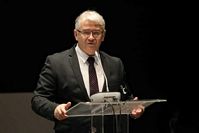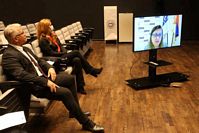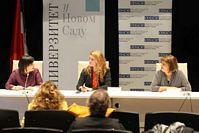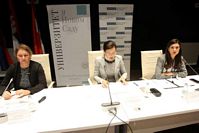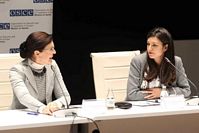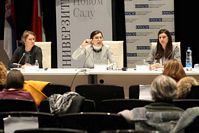A one-day conference “Action plans for gender equality: challenges and opportunities for universities” was organized at the Central Building of the University of Novi Sad, on 6th December 2021.
The Conference was organized by the University of Novi Sad, with the support of the OSCE Mission in Serbia, with the main aim to gather university professors, experts, and policy creators, for the discussion on important issues and best practices in implementation of gender equality perspective at universities.
Following the introductory speech by the Rector of the University of Novi Sad Prof. Dr. Dejan Madić, the audience was addressed by the Deputy Head of the OSCE Mission to Serbia Mrs. Sarah Groen and the Commissioner for the Protection of Equality Mrs. Brankica Janković.
The programme included two sessions, with the presentations and discussions on possibilities and challenges in organizational transformation, in the context of gender equality actions plans in the academic community. Furthermore, the conference also offered in-depth look into the tools for transformation of education and research, toward integrating gender equality in academic community. During the first session, the presentations were given by Prof. Dr. Sabina Halupka Rešetar, Vice-Rector for International Cooperation of UNS, Prof. Dr. Nevena Petrušić from the University of Niš, and Dr. Marcela Linková from the Institute of Sociology of the Czech Academy of Sciences; and the second session included the presentations given by Prof. Dr. Dragica Vujadinović from the University of Belgrade, Prof. Dr. Zita Spahić-Šiljak from the TPO Foundation in Sarajevo, Bosnia and Herzegovina, and Prof. Dr. Liisa Husu from the
Örebro University, Sweden, as well as the joint presentation by Prof. Dr. Vesna Nikolić Ristanović and Dr. Sanja Ćopić from the Victimology Society of Serbia.
The moderator of the first session was Dr. Zorana Antonijević from the OSCE Mission in Serbia and the moderator of the second session was Assistant Professor Dr. Karolina Lendak-Kabok from the University of Novi Sad.
The Conference was concluded with the main recommendations regarding the next steps in implementation of gender equality perspective in higher education. Firstly, it was concluded that Serbia has a solid gender equality strategic framework, and that the gender statistics have been improving through time. Implementation of new rules by the European Commission that refer to the adoption of gender equality plans at universities represents the opportunity to additionally improve the field of gender equality at higher education institutions. Likewise, the Law on Gender Equality, adopted in 2021, has introduced the obligation of higher education institutions to adopt plans and programmes for promotion of gender equality.
Furthermore, the conference participants strongly stressed that gender equality action plans need to include clear measures with measurable and reachable indicators, and that it is of great importance to establish mechanisms and bodies for implementation of these plans, as well as mechanisms to monitor the realization of goals and tasks that were defined in these plans. One of the conclusions was also that the programmes and curricula in social sciences, humanities and art, as well as in STEM sciences, should contain a gender dimension at all levels of study, starting from undergraduate to doctoral studies.
In the light of gender-based violence, as one of the important aspects of gender perspective, it was stated that this phenomena is not recognized enough at universities in general, and it is very important to establish mechanisms for combating gender-based violence at higher education institutions, as well as to establish procedures, measures and policies for its elimination.
Finally, the participants stressed the importance of establishing closer ties between the University of Novi Sad and other institutions, such as the Provincial Ombudsman and the Provincial Institute for Gender Equality, and the importance of revitalization of already available mechanisms. The University of Novi Sad should also continue to build a network of partner institutions which offer support in combating gender-based violence.
The Conference was organized in hybrid format, combining both live audience and online participants. It was one of the activities within the UNIGEM Project (University and Gender Mainstreaming) that deals with the issues of gender equality and gender-based violence at UNIGEM partner universities. The UNIGEM Project includes the network of 17 universities which signed a joint Memorandum of Understanding in October 2021. It is the first project of this kind in the region, with 10 public and 7 private universities from Bosnia and Herzegovina, Croatia, Republic of Serbia, and Montenegro.
